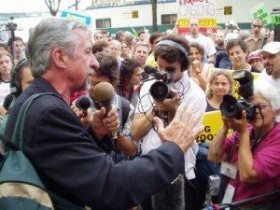Harkening back to his days as a student antiwar activist in the 1960s, but also drawing heavily on the example of the contemporary Caravan for Peace (with justice and dignity to end the drug war), which emerged out of Mexico this summer to traverse the United States, Tom Hayden used the occasion of the opening of the 41st National NORML Conference to call for a social justice peace movement to end the war on drugs in the US.
 Hayden, who co-founded the radical anti-war Students for a Democrat Society in 1966, was prosecuted as one of the Chicago Seven, and went on to serve as a California state assemblyman, told the opening day crowd he had been following and covering drug war events in Mexico and Central America for some time, and that he was “astonished” at how the Mexican drug war was covered in the US.
Hayden, who co-founded the radical anti-war Students for a Democrat Society in 1966, was prosecuted as one of the Chicago Seven, and went on to serve as a California state assemblyman, told the opening day crowd he had been following and covering drug war events in Mexico and Central America for some time, and that he was “astonished” at how the Mexican drug war was covered in the US.
“It’s estimated that 60-70,000 Mexicans have been killed in the drug war since 2007,” Hayden noted. “The funding came from the US, the weapons came from the US, the advisors came from the DEA—the whole thing is an extension of US drug and national security policy, and it was met with a terrible silence in this country.”
Digging deeper, Hayden came across the Mexican movement led by poet Javier Sicilia, which he described as being something like Mothers Against Drunk Drivers, “a movement whose hard core were people who thought of themselves as victims, who had experienced the disappearances of family members, their deaths, beheadings, torture.” Such movements typically play into the hands of hard law and order, Hayden noted, with calls for more police, more imprisonment, more suppression.

Tom Hayden addressed the antiwar movement, 2004 (wikimedia.org)
“But in this case, it was more along the lines of saying ‘enough, this war is causing more suffering than anything it seeks to suppress or prevent,'” the veteran activist continued. “These were not people calling for the legalization of drugs, but for an end to the drug war on the assumption that nothing good could come of it, and that only if were ended would it be possible and necessary to consider alternatives like legalization.”
“Javier Sicilia is a poet and a man of the left, and seems to be able to channel the feelings of all these people in Mexico as a sort of therapeutic experience connected to political demands,” Hayden said. “There hasn’t been a strong peace movement perspective brought against the drug war here. It could be a matter of framing, but a drug war peace movement could be a strong complement to medical or legalization. We need a medical approach, not a military one.”
The Caravan for Peace has attempted to plant that seed on both sides of the border, and in a historically unique fashion, Hayden argued.
“I don’t remember any group of Mexicans since the mid-1800s who organized to come north over the border to protest policies in the United States,” he said. “They came looking for others who have suffered violence, incarceration, repression, addiction. They came looking to build community with people all across the US.”
And the timing couldn’t be more critical, Hayden suggested.
“Pressure from south of the border is starting to put some muscle behind the moral pressure for legalization here,” he said, citing the work of the Latin American Commission on Drugs and Democracy and, more recently, the Summit of the Americas, where the US couldn’t prevent the issue of the failed drug war from rearing its head. “The drug war is now becoming a serious impediment to the US conducting its foreign policy with Latin America. An effort to mobilize a peace movement against the drug war is not only overdue, but could be decisive for your efforts.”
Hayden hardly mentioned the word “marijuana,” but his message was clear: For the movement to advance, it has to go beyond fighting merely for the right to get high, but instead needs to root itself in the broader cause of social justice. With the NORML conference’s theme this year being The Final Days of Prohibition, Hayden certainly gave his audience something to think about.
Article republished from Stop the Drug War under Creative Commons Licensing









